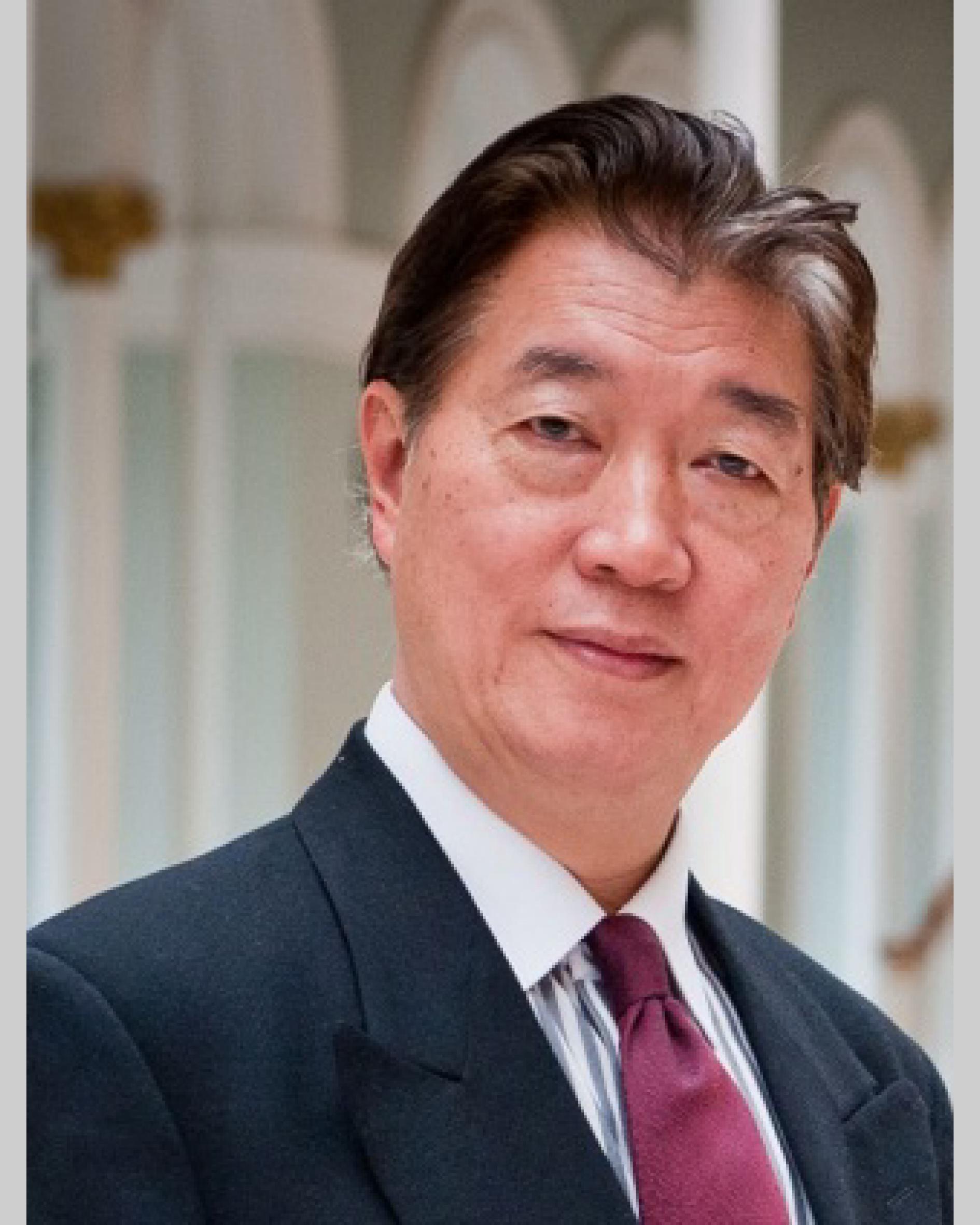
Portrait of Ambassador Shen Lyu-shun
Ambassador Shen Lyu-shun (沈呂巡大使) was born in Taipei on 12 November 1949 in the 38th year of the Republic of China. At that time, the civil war between the Kuomintang government and the Communist Party was in full swing, and the government was about to move south to Taiwan. Lyu-shun was born at a fateful time when the country was in danger and he also happened to be born on the same day as the Father of the Republic, Dr. Sun Yat-sen, so accordingly he was nicknamed Kuo (國-meaning country), which showed the high expectations that his family had for him.
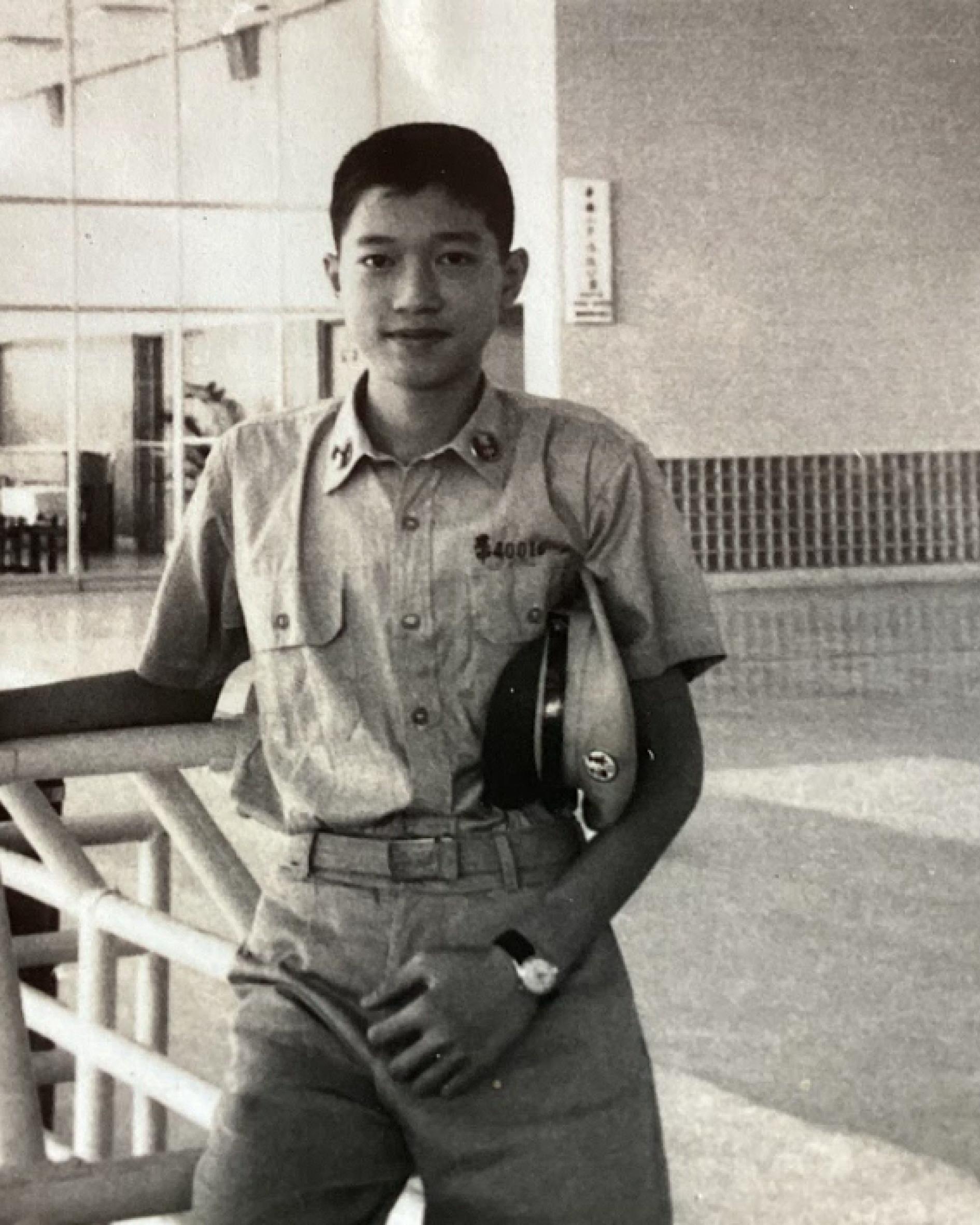
During Taipei Municipal Jianguo High School
Lyu-shun was the eldest son ; he possessed since childhood a handsome appearance with a tall and straight figure and exhibited gracious manners. With excellent grades at school, he was much loved by his parents. However he was very self-disciplined and studied extraordinarily hard, always thinking that he was not bright enough. Lyu-shun was the sixth generation descendent of Shen Pao-chen (沈葆楨 1820-1879), a famous minister and viceroy of Chiang-nan Province and Chiang-hsi Province in the Ch’ing Dynasty. Shen Pao-chen was ordered to come to Taiwan in the 13th year of the T’ung-chih reign (1874) in the Ch’ing Dynasty as a result of the “Peony Club Incident” to negotiate with Japan. Subsequently with the policy of developing the mountains, pacifying the native population, construction of cities and roads, establishing the Taipei government, planning of railways and electricity and constructing the platform of Tainan’s “Golden City of Eternal Years”, he became a driving force for the modernization of Taiwan. The character shun (巡–meaning patrol) in Lyu-shun’s name, took its meaning from the history that Shen Pao-chen once patrolled Taiwan. Shen Pao-chen’s wife, Lin P’u-ch’ing (林普晴 1821-1873), was the second daughter of Lin Tsu-hsü (林則徐). During the civil war in the Taiping Rebellion, she defended the city on behalf of her husband and asked for help by letter in blood. She was an outstanding woman with both ability and integrity. Since his family was closely involved with modern Chinese history, Lyu-shun since young became deeply interested in politics and history with many family elders working in diplomatic circles, serving as ambassadors and envoys. At the age of sixteen, he could recognize the national flags and anthems of different countries and was familiar with the biographies of envoys stationed abroad. He was determined to follow the family tradition and take diplomacy as his lifelong career. He did not waver in his aspiration even after witnessing the negative tide on the diplomatic front with the withdrawal of the Republic of China from the United Nations and the termination of diplomatic relations by allied countries one after the other. He attended high school in Taipei Municipal Jianguo High School, followed by university at the Law Faculty of the School of Law and Business in Chung Hsing University (now National Taipei University). Upon graduation, he was admitted to the Institute of Foreign Affairs of National Chengchi University. After completing military service, he won the Chung-shan Scholarship to study at the University of Pennsylvania, a famous Ivy League schools in the United States. In 1981, he published his doctoral dissertation Peking’s Policy Toward Taiwan in the 1970s : A Study from the Strategic Perspective and Received his Ph.D. in International Relations.
In 1979, the 68th year of the Republic of China, Lyu-shun made his mark in the National Council of Construction with his eloquent discussions which attracted attention from all sides and were repeatedly reported by the media. He followed up immediately afterwards with the publication of special articles in newspapers, such as Anti-United Front and Political Counter-Offensive—Impressions from the Political and Diplomatic Group of the National Council of Construction, Review and Suggestions for Diplomatic Work, On the Research and Design of Diplomatic Work, etc. Each article contained a broad structure with a powerful and cogent theory. As a beginner, he already showed extraordinary vision and keen edge.

Lyu-shun (first right) with Professor Ch’iu Hung-ta (third right)
After obtaining his Ph. D. degree, Lyu-shun first worked as a postdoctoral researcher for one year under Professor Ch’iu Hung-ta of the University of Maryland, an authority on international law, before entering the service of the Ministry of Foreign Affairs. The Ministry of Foreign Affairs work unit was the first and only profession of Lyu-shun’s entire career. His career can be divided simply into two stages : from the 1980s, he focused on American affairs, in 2003 he was transferred to Europe, further developing his European experience, which made him a rare talent among the diplomats of the Republic of China with expertise in both Europe and the United States.
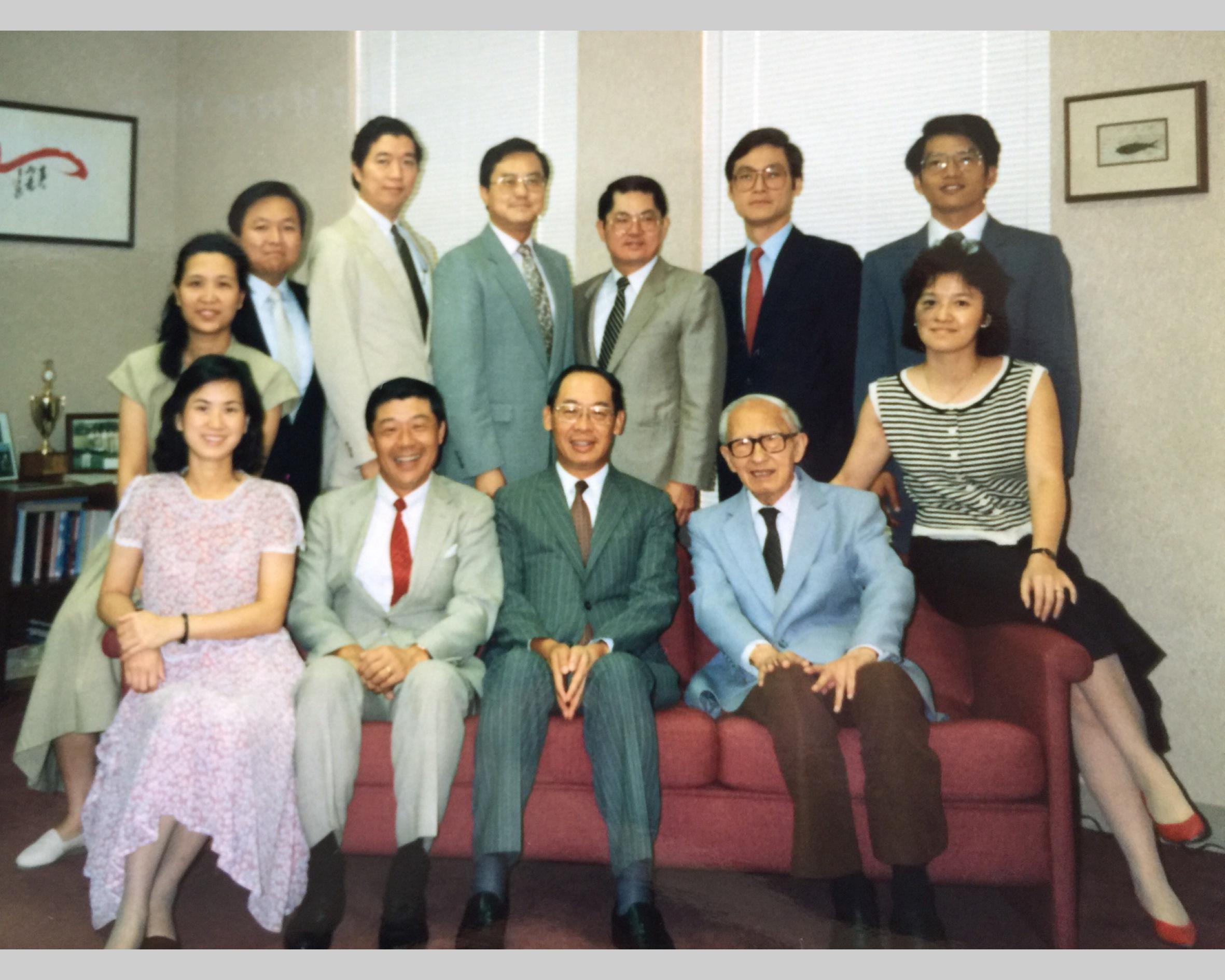
In 1980s with Ambassador Ch’ien Fu, Ambassador Yüan Chien-sheng and colleagues from the Congressional Team
In 1982, Lyu-shun was invited to serve as a consultant in the congressional group of the Coordinating Council for North American Affairs (now the Taipei Economic and Cultural Representative Office in the United States). At that time, the Ministry of Foreign Affairs promoted a new policy model of “congressional diplomacy” towards the United States. Lyu-shun was young and able ; he worked tirelessly–he often accompanied members of the U.S. Congress and their assistants in their visits to Taiwan, joined symposiums everywhere and laid a solid foundation for the long-term and profound friendship between the Republic of China and the U.S. Congress. In 1988 he was transferred back to the Ministry of Foreign Affairs as assistant director-general and the first section chief of the Department of North American Affairs. In 1991 he was transferred to the Taipei Economic and Cultural Representative Office in Kansas City as director general. In 1993 he served as the director of the Political Division, then transferred to be the director of the Congressional Division of the Taipei Economic and Cultural Representative Office in the United States. In 1996 he returned home to serve as the director general of the Taipei Economic and Cultural Representative Office in the United States, and in 1999 he was sent to be the Deputy Representative of the Taipei Economic and Cultural Representative Office in United States.

Introducing Taiwan Phalaenopsis orchid to the Queen of England

In front of the Taipei Representative Office in the United Kingdom
In 2003 Lyu-shun was transferred from the United States to be the director general of the Taipei Economic and Cultural Representative Office in Geneva, Switzerland, and thus started his career in Europe. Geneva is home to many international organizations, such as WTO, WHO, etc. His main job was to deal with various NGOs, so Lyu-shun further expanded his international experience and diplomatic expertise. In 2008 he was transferred to be the representative to the European Union and the representative in Belgium. In 2009 he returned to Taiwan to take over as the deputy minister of the Ministry of Foreign Affairs. In 2011 he was sent to be the representative of the Taipei Representative Office in the United Kingdom, in 2014 he was transferred to be representative of the Taipei Economic and Cultural Representative Office in United States until 2016 when due to replacement of the governing party, he had to handover his duties hastily within two weeks and returned to Taiwan to retire.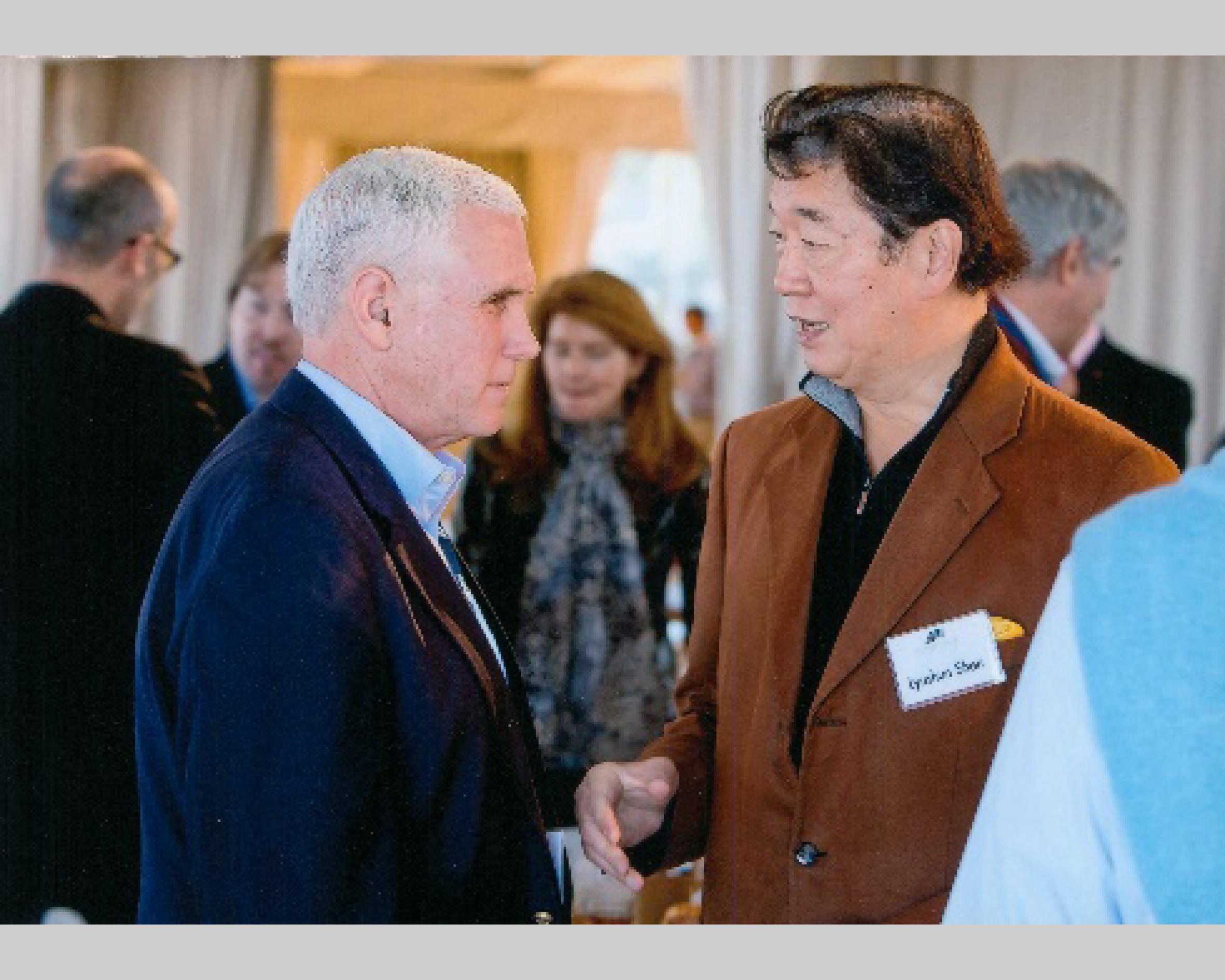
With former US Vice President, Mike Pence
Shen Lyu-shun’s diplomatic career spanned thirty-five years. Regardless of whether he was in the United States, in Europe, abroad, or within the Ministry and regardless of whether the job level was low or high, his consistent work ethic was to work by exertion of maximum effort. News media reporting on his contributions often mentioned EU Schengen visa-free entry, cleverly recommending the Taiwan Phalaenopsis orchid to Queen Elizabeth II who passed away not long ago, ensuring that the flag of the Republic of China was flown at the London Olympics, presenting a wreath with the national emblem of the Republic of China during the event for the “Commemoration of the 70th Victory Anniversary of the Allied Forces Against Japan” so that the Chinese Communist ambassador left the meeting angrily, as well as flying the flag of the Republic of China at Twin Oaks in Washington DC, etc. His work not only defended the dignity of the country, but also benefit the lives of ordinary people. As a matter of fact, Lyu-shun in serving in successive important positions in the United States and Europe, participated in almost all battles involving major diplomatic affairs. Although his contributions will still need to be assessed and sorted by future generations, it is worth picking up his notable pronouncements in diplomatic work.

Editing historical diplomatic materials to protect legal heritage
In 2015 at the commemorative event of the “70th Victory Anniversary of the Allied Forces Against Japan”, Chinese Communist Party officials protested against the appearance of the National Emblem of the Republic of China on the wreath. Lyu-shun said, “(During the Anti-Japanese War) this National Emblem was in every battle, on every fallen officer and soldier and on the helmet of each serviceman. This is a historical fact.” A single comment caused the CCP officials to leave the meeting in humiliation. Many people praised him for sorting out historical diplomatic materials. In 2011 he published “A Century of Resilient Tradition, Exhibition of the Republic of China’s Diplomatic Archives”. However he said since all treaties signed with foreign countries from the end of the Ch’ing Dynasty, such as the Treaty of Nanking, the Treaty of Shimonoseki, etc., are in the collection of the Ministry of Foreign Affairs of the Republic of China, the purpose of the publication is not for only historical research, but more importantly, to highlight where the legitimacy is based between the two sides of the strait. Apparently the publication of this collection of treaties is of great significance in showing the transmission of legitimacy. How many people today can understand his profound intention?

Presenting floral wreath with National Emblem at the 70th Victory Anniversary of the Allied Forces Against Japan
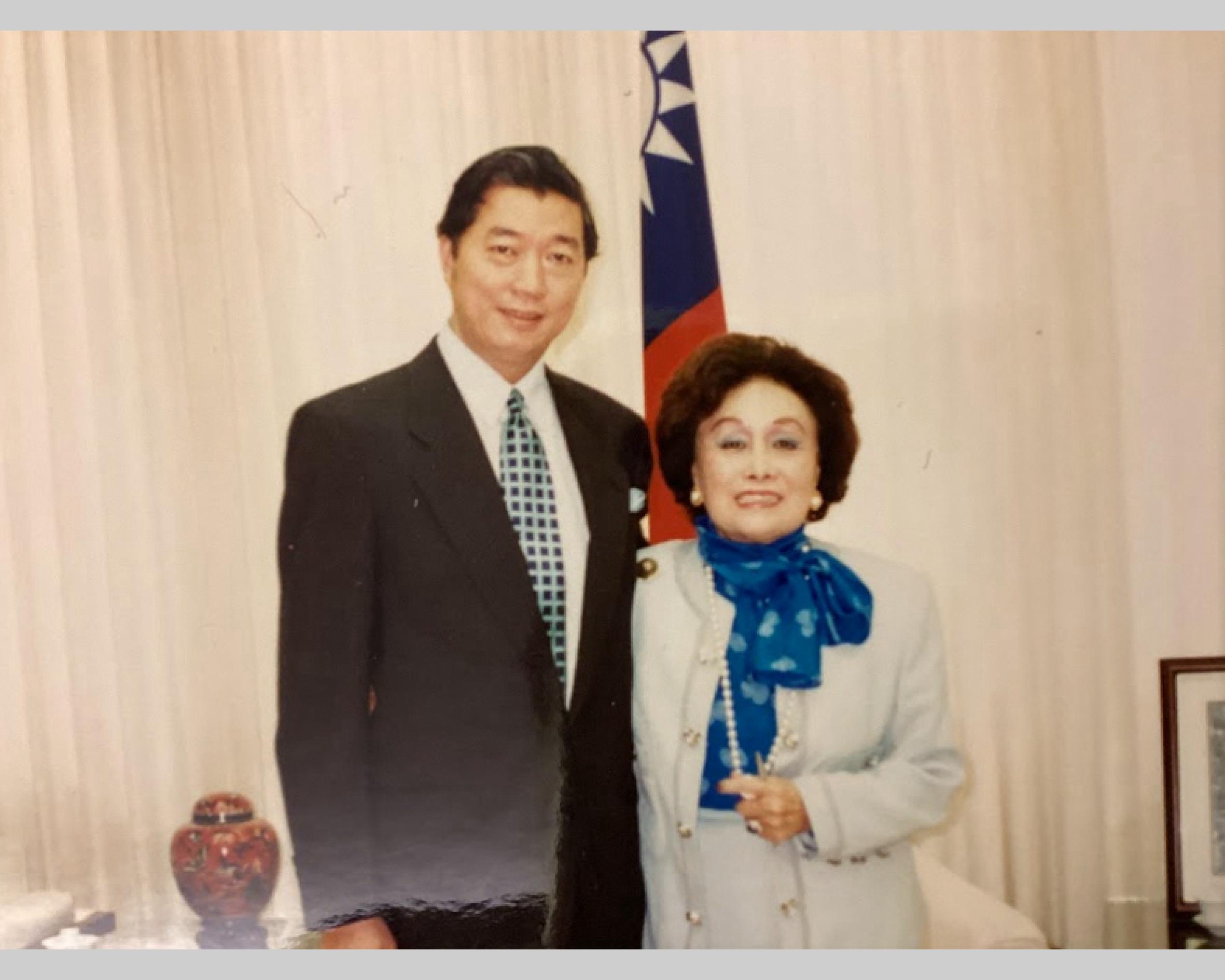
With Anna Chan Chennault, widow of Lieutenant-General Claire Lee Chennault
On New Year’s Day in 2015, he raised the National Flag at Twin Oaks. The US side complained about this, and there were even more criticism within the country. However, he was adamant that Twin Oaks belonged to the Republic of China and the flag-raising ceremony was an internal event. One should not report everything to the US side, “If you have to ask the Americans everything, this is not a diplomat, this is a liaison officer.” His insistence on national dignity is as footsteps in a lonely valley, rare and valuable today

Raising the National Flag at Twin Oaks on New Year's Day
Shen Lyu-shun understood very clearly that diplomatic work consists not just of high-level negotiations, engagement and skirmish between countries. Diplomatic work is also relevant to the ordinary lives of people, from visa-free entry for convenient travel to assistance when encountering major difficulties in life. One Taiwanese compatriot had to give up his prematurely born daughter for adoption owing to poverty more than 30 years ago. In 1995 Lyu-shun did everything possible to help find this Taiwanese girl who was adopted and raised in the United States and helped the family reunite. More well-known is the case of Zain Dean, an Indian-British businessman, who killed Huang Ch’ün-te, a newspaper delivery boy. Zain Dean fled to the UK. Lyu-shun, as the representative in the United Kingdom, persevered in assisting with litigation in the United Kingdom. He believed that if a citizen of the Republic of China is harmed, “You will be hunted down to the ends of the earth”. His hard work brought major advancement to the development of mutual legal assistance between Taiwan and Britain. Lyu-shun made special trips from London to Edinburgh to attend every hearing of the Edinburgh court in order to show the determination of the government of the Republic of China in pursuing fugitives. During Shen Lyu-shun’s diplomatic career, such examples of assistance to ordinary citizens were not uncommon.

With former US Secretary of State, Colin Luther Powell
Lyu-shun was known for a quick temper with the sobriquet of “Cannon Shen”. He spoke with authority without evasion when answering questions in the Legislative Yuan. Even the usually tough legislators had to pay special attention and tread carefully. His battles of words with the legislators were almost regarded by media reporters as a spectacle of the Legislative Yuan. A legislator once deliberately provoked him and asked Lyu-shun about the Executive Yuan’s promotion of the “Big Mouth Regulation”. intending to provoke “Cannon Shen” to open fire on the spot. Lyu-shun replied: “The era of execution for private whispers shouldn’t happen again.” This meant that there should be no more restrictions on freedom of speech today. It is said that when the legislator heard the words, he said “Ah”, and was at a loss. The reporter also hurried back to look it up in the dictionary, only to realize that this was an allusion from the Historical Records of the Western Han Dynasty. Lyu-shun had a sense of humor, but as a dictionary is required to understand his humor, it may be excessive.
It is said that, “The many yes men are not as valuable as the one person who remonstrates.” Shen Lyu-shun was born a remonstrator, and in the environment of the Legislative Yuan, he could not drift with the flow, so he could only shoot his cannons and humor on occasion.
The artillery fire of “Cannon Shen” did not only target legislators; almost no colleague or subordinate was spared. Perhaps some colleagues may harbour resentment, but those who knew him understood his strict self-discipline and high standards, and so were eager to improve. His strict standards were not just for administration and management, but extended to all official documents, telegrams and letters which he personally proofread and corrected without slackening. When he was young, Lyu-shun once said that he most admired Yang Chu (楊朱) who “refuses to pluck out one hair to benefit the world.” His theory was that since he did not want to pluck one hair to benefit others, naturally he also did not need others to pluck one hair to benefit him. Regardless of whether his idea is valid in philosophical dialectics, this showed his straightforward character and that he neither wanted to trouble nor to take advantage of other people. In his view, mistakes in official documents, telegrams and letters cause trouble for other people, and Cannon Shen had no choice but to fire as a last resort.

Receiving honours from President Ma Ying Jeou
In 2016 Lyu-shun stepped down hastily from his post as the representative to the United States and returned to Taiwan to retire. Nevertheless he remained devoted to diplomatic work, often writing articles in newspapers critiquing current events, accepting invitations to speak from various parties, and also accepted oral history interviews with Academia Sinica. He was also a part-time lecturer in the Department of Political Science, National Taiwan University, teaching material related to diplomatic history. The application of his broad knowledge, deep learning, eloquence and accumulation of years of practical experience to teaching was a blessing for the students and his courses were very popular.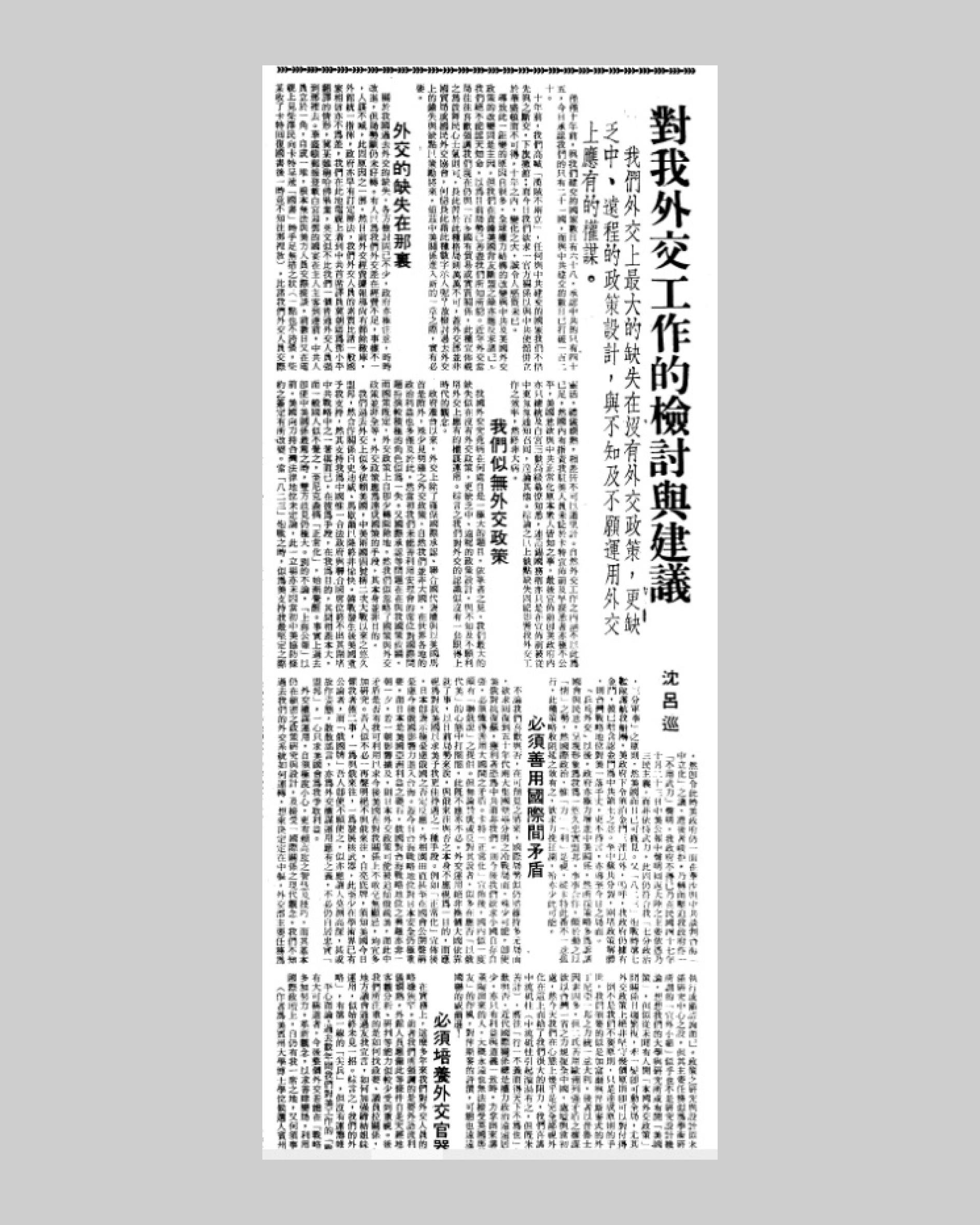
Early article published in 1979
Colleagues and friends advised him to write his decades of diplomatic experience into memoirs as soon as possible. If he could write a book based on his personal experience, together with his knowledge of the past and the present, and his proficiency in diplomatic history, it would be an invaluable work to pass on to future generations. Lyu-shun was also quite willing, but in early 2019, he unfortunately suffered a stroke. Since then, he lost his unimpeded eloquence, his brilliant pen, and the ability to write long essays.

Last article, published on November 28, 2022, concerned with national affairs
One year after his illness, Lyu-shun resumed writing, publishing his experiences which relate to current events. Even though relatives and friends notice his weakening physical strength and gradual exhaustion of intellectual power, he continued to work very hard to think about the topic, research material, and write one article after another on current issues. In the last two years of his life, he was like “one who has talent incurs misfortune”, slowly draining himself until finally he ran out of fuel. His last article on foreign affairs after the 20th National Congress of the Communist Party of China, On the New and Old Diplomatic Teams of the Chinese Communist Party was published in the newspaper on November 28, 2022. At that time, he was already extremely weak, short of breath, suffering from edema, unable to eat, and no longer dashing as before, but remained an admirably brave Shen Lyu-shun.
On December 10, 2022 Lyu-shun collapsed from heart failure. He was no longer breathing and had no heart beat. He was sent to Keng-sheng Hospital in Xindian and spent more than 20 days in the intensive care unit. During that time, he recovered consciousness slightly and Madame Shen heard the last three words he uttered were "Ministry of Foreign Affairs" which was always in his mind-such was his deep devotion.
Full of diplomatic ideals and practical experience, Shen Lyu-shun did not have time to write down his remarkable life. He passed away at 7:00 am on 6 January 2023, bringing loss to the country and society and infinite sorrow to family and friends.

Family photo before the Pyramid in Egypt












